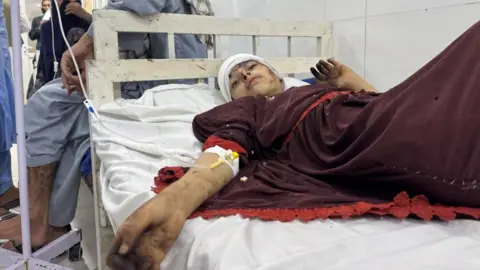More than 800 people have been killed - and nearly 3,000 injured - after a magnitude-six earthquake struck eastern Afghanistan just before midnight on Sunday, the United Nations' humanitarian agency has said. Most of the deaths are in Kunar province, officials say, warning that the death toll may rise significantly as entire villages have been destroyed by the quake. The epicentre is in a remote mountainous area, making it difficult for rescue operations to be carried out. The scale of devastation is unimaginable, a Taliban official said.
The disaster comes as Afghanistan reels from a severe drought, aid cuts and what the World Food Programme describes as an unprecedented crisis of hunger. The earthquake hit at 23:47 (19:47 GMT) on Sunday, some 27km (17 miles) east of Jalalabad - the country's fifth-largest city, in eastern Nangarhar province.
Faridullah Fazli was fast asleep at home in Asadabad, on the banks of the Kunar river, and the tremor jolted him awake. There was a very strong earthquake, accompanied by sounds that were very scary, he told the BBC. We didn't sleep until morning. After the earthquake, there were small tremors, and there are still.
A resident of Mazar Dara, in the Nurgal region, reported that 95% of the village had been destroyed, with five to ten injured individuals in every household. The worst damage was in Kunar - a rugged, mountainous region with limited farmland.
Roads in the area are often mud tracks winding around mountains - homes are made of clay, stones and mud. With roads blocked, rescue operations can only be carried out by air. However, more than 100 flights have since been conducted since the earthquake.
Entire villages are flattened, and roads to deep mountainous areas are still closed. So now, our priority is not finding dead under the rubble, but rather reaching out to those injured, a Taliban official in Kunar province said. There are cases of people trapped under the rubble for hours, reportedly dying as they awaited rescuers.
Since August 2021, Afghanistan has been under the control of the Taliban, whose government is only recognised by Russia. Several aid agencies and non-governmental organisations suspended their work in Afghanistan with the arrival of the hardline Islamist group to power. Most foreign donations to Afghanistan have been suspended, and international sanctions are still in place, although exemptions have been made for humanitarian relief. The Taliban has launched an appeal for assistance as the country faces a severe humanitarian crisis.
The disaster comes as Afghanistan reels from a severe drought, aid cuts and what the World Food Programme describes as an unprecedented crisis of hunger. The earthquake hit at 23:47 (19:47 GMT) on Sunday, some 27km (17 miles) east of Jalalabad - the country's fifth-largest city, in eastern Nangarhar province.
Faridullah Fazli was fast asleep at home in Asadabad, on the banks of the Kunar river, and the tremor jolted him awake. There was a very strong earthquake, accompanied by sounds that were very scary, he told the BBC. We didn't sleep until morning. After the earthquake, there were small tremors, and there are still.
A resident of Mazar Dara, in the Nurgal region, reported that 95% of the village had been destroyed, with five to ten injured individuals in every household. The worst damage was in Kunar - a rugged, mountainous region with limited farmland.
Roads in the area are often mud tracks winding around mountains - homes are made of clay, stones and mud. With roads blocked, rescue operations can only be carried out by air. However, more than 100 flights have since been conducted since the earthquake.
Entire villages are flattened, and roads to deep mountainous areas are still closed. So now, our priority is not finding dead under the rubble, but rather reaching out to those injured, a Taliban official in Kunar province said. There are cases of people trapped under the rubble for hours, reportedly dying as they awaited rescuers.
Since August 2021, Afghanistan has been under the control of the Taliban, whose government is only recognised by Russia. Several aid agencies and non-governmental organisations suspended their work in Afghanistan with the arrival of the hardline Islamist group to power. Most foreign donations to Afghanistan have been suspended, and international sanctions are still in place, although exemptions have been made for humanitarian relief. The Taliban has launched an appeal for assistance as the country faces a severe humanitarian crisis.


















